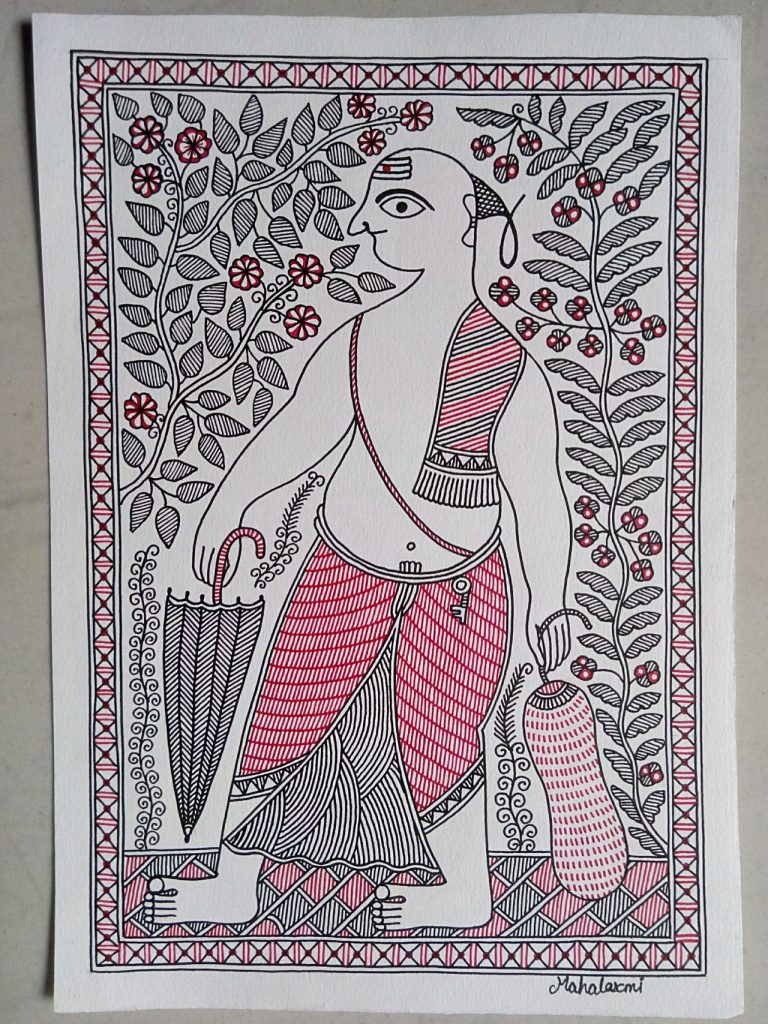Some soldiers, who were close by, saw this, and rushed to her side. They beat the barber and tied him up, and then dragged him to court, with the barber’s wife closely following them. In the presence of the judge, the soldiers said ” Lord! This barber has disfigured this innocent lady, for no fault of hers. Please help us and punish this man.”
The judge looked at the barber, and said…

“Tell me, o barber, why did you harm your wife? Did she kill anyone? Did she steal? Was she unfaithful? What crime did she commit?”
The poor barber was not able to speak, due to the intense pain he had experienced thanks to the beating he had received just minutes before. Seeing him silent, the judge pondered “The soldiers must be telling the truth. This man is guilty and he has physically abused this poor woman. It has been said…”
भिन्न-स्वर-मुख-वर्णः शङ्कित-दृष्टिः समुत्पतित-तेजाः ।
भवति हि पापं कृत्वा स्व-कर्म-सन्त्रासितः पुरुषः ॥ २१० ॥
bhinna-svara-mukha-varṇaḥ śaṅkita-dṛṣṭiḥ samutpatita-tejāḥ |
bhavati hi pāpaṃ kṛtvā sva-karma-santrāsitaḥ puruṣaḥ || 210 ||
A man who commits a crime is tormented by his own actions, and his changed voice, his flushed face, his doubtful eyes and the lost glow on his face give away the disturbed state of his mind.
आयाति स्खलितैः पादैर् मुख-वैवर्ण्य-संयुतः ।
ललाट-स्वेद-भाग् भूरि-गद्गदं भाषते वचः ॥ २११ ॥
āyāti skhalitaiḥ pādair mukha-vaivarṇya-saṃyutaḥ |
lalāṭa-sveda-bhāg bhūri-gadgadaṃ bhāṣate vacaḥ || 211 ||
In a court, if a man stumbles when walking, if he looks pale, if his forehead listens with sweat, and if he stammers when speaking – he is surely guilty of the crime.
अधो-दृष्टिर् वदेत् कृत्वा पापं प्राप्तः सभां नरः ।
तस्माद् यत्नात् परिज्ञेयाश् चिह्नैर् एतैर् विचक्षणैः ॥ २१२ ॥
adho-dṛṣṭir vadet kṛtvā pāpaṃ prāptaḥ sabhāṃ naraḥ |
tasmād yatnāt parijñeyāś cihnair etair vicakṣaṇaiḥ || 212 ||
If, in a court, a man speaks with his eyes fixed to the ground, and refuses to make eye contact, then he is surely guilty of the crime.
प्रसन्न-वदनो दृष्टः स्पष्ट-वाक्यः सरोष-दृक् ।
सभायां वक्ति सामर्षं सावष्टम्भो नरः शुचिः ॥ २१३ ॥
prasanna-vadano dṛṣṭaḥ spaṣṭa-vākyaḥ saroṣa-dṛk |
sabhāyāṃ vakti sāmarṣaṃ sāvaṣṭambho naraḥ śuciḥ || 213 ||
If, in a court, a man is happy, maintains a smile, speaks clearly, makes eye contact, and seems stable in mind and word, then he is surely innocent of the crime.
“This barber has all the signs of being guilty. He has assaulted an innocent woman, and hence deserves to die. May he be hanged till death!” the judge pronounced his verdict.
As the soldiers started dragging the barber towards the gallows, Devaśharman happened to reach there. He approached the judge and exclaimed “My good sir! This poor barber is being punished for no reason. He is innocent. Hear me carefully –
जम्बूको हुडु-युद्धेन वयं चाषाढ-भूतिना ।
दूतिका पर-कार्येण त्रयो दोषाः स्वयं कृताः ॥ १७३ ॥
jambūko huḍu-yuddhena vayaṃ cāṣāḍha-bhūtinā |
dūtikā para-kāryeṇa trayo doṣāḥ svayaṃ kṛtāḥ || 173 ||
The difficulties encountered by the fox which went in between the fighting rams, and by me because of Aashaadabhooti, and by the barber’s wife, were all self-made.
“How is that so?”, asked the judge.
Devaśharman went on to narrate all the three events in complete detail. Hearing his story, the judge was surprised, and decided to release the barber. He also ordered for the barber’s wife to be punished. Devaśharman, having overcome the grief he had experienced from losing his money, now returned to the monastery, poorer, but wiser.
“And that is why I said”, concluded Damanaka, “that sometimes we have ourselves to blame for our misfortunes, much like in the case of the jackal, the monk and the messenger-girl.
Karataka nodded his head. “So what should we do now, in this situation?”
Damanaka replied…
to be continued…
